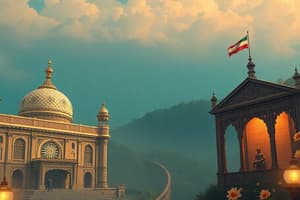Podcast
Questions and Answers
Study Notes
Overview of South African Democracy
- Establishment: South Africa transitioned to a democratic system in 1994 after decades of apartheid.
- Key Figures: Nelson Mandela emerged as a prominent leader following his release from prison in 1990 and became the first black president in 1994.
Constitutional Framework
- Constitution: Adopted in 1996, regarded as one of the most progressive in the world.
- Bill of Rights: Guarantees fundamental rights and freedoms for all citizens.
Political Structure
- Type of Government: Parliamentary democracy with a multi-party system.
- Branches of Government:
- Executive: Led by the President, who is elected by the National Assembly.
- Legislative: Bicameral Parliament consisting of the National Assembly and the National Council of Provinces.
- Judiciary: Independent courts, including the Constitutional Court, which oversees the constitutionality of laws.
Electoral System
- Voting: Universal adult suffrage; elections are held every five years.
- Proportional Representation: Political parties receive seats in Parliament based on the percentage of votes they receive.
Political Parties
- African National Congress (ANC): Dominant party since 1994.
- Other Key Parties:
- Democratic Alliance (DA)
- Economic Freedom Fighters (EFF)
- Inkatha Freedom Party (IFP)
Challenges to Democracy
- Corruption: Ongoing concerns about corruption within government institutions.
- Service Delivery Protests: Public discontent leading to protests over inadequate services.
- Economic Inequality: High levels of unemployment and disparity among citizens.
Civil Society and Media
- Role of Civil Society: Active NGOs and interest groups contribute to democratic processes and accountability.
- Media Freedom: Generally robust, but instances of intimidation and censorship have been reported.
Conclusion
- South African democracy has made significant strides since 1994, but continues to face challenges that require ongoing attention and reform for sustainable governance.
Overview of South African Democracy
- South Africa's democratic transition occurred in 1994, ending decades of apartheid.
- Nelson Mandela became a key figure in this transition, serving as the first black president after his release from prison in 1990.
Constitutional Framework
- The South African Constitution was adopted in 1996 and is recognized globally for its progressive nature.
- A comprehensive Bill of Rights is included, ensuring fundamental rights and freedoms are protected for all citizens.
Political Structure
- South Africa operates as a parliamentary democracy with a multi-party system.
- The Executive branch is led by the President, elected by the National Assembly.
- The Legislative branch consists of a bicameral Parliament: the National Assembly and the National Council of Provinces.
- The Judiciary is independent and includes the Constitutional Court, which monitors the constitutionality of legislation.
Electoral System
- Universal adult suffrage is practiced, with elections occurring every five years.
- A proportional representation system is used, allowing political parties to gain parliamentary seats in accordance with their percentage of votes.
Political Parties
- The African National Congress (ANC) has been the dominant political party since the transition to democracy in 1994.
- Other significant political parties include the Democratic Alliance (DA), Economic Freedom Fighters (EFF), and Inkatha Freedom Party (IFP).
Challenges to Democracy
- Corruption continues to be a significant issue within government institutions.
- Service delivery protests arise from public dissatisfaction regarding inadequate government services.
- Economic inequality is pronounced, with high unemployment rates and disparities affecting citizens' living conditions.
Civil Society and Media
- Civil society organizations, including NGOs and interest groups, play an active role in fostering democracy and holding the government accountable.
- Media in South Africa is relatively free, although there have been reports of intimidation and censorship affecting journalists.
Conclusion
- While South Africa has made notable progress in its democratic journey since 1994, ongoing challenges necessitate reforms for the sustainability of good governance.
Studying That Suits You
Use AI to generate personalized quizzes and flashcards to suit your learning preferences.
Description
Explore the establishment of South African democracy, detailing its transition in 1994 after apartheid. Learn about key figures like Nelson Mandela and the significance of the 1996 Constitution and Bill of Rights in shaping a progressive nation.




